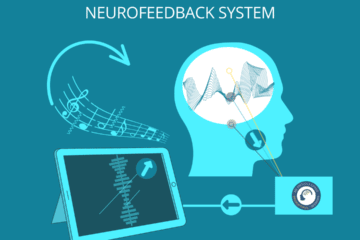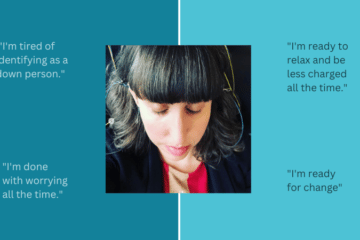I wonder if you’ve noticed that when a depressed episode comes on, our bodies feel frozen. Moving feels like trudging through thick molasses, yet the volume of our thoughts are loud and clear: “You’re a loser! You can’t even get out of bed! How worthless! You’ll never be successful at this rate!” How did it happen that we became our own worst enemy? We can start by understanding how we’ve identified with that voice. We can literally feel it in our bodies when it creeps in, then we solidify around it, holding on to it, and now identifying as a “depressed person.” It is a very different experience to note ourselves as people living with depression, than identifying ourselves and associating our being with “a depressed persona.”
In real time, we can start to do some internal work. Tara Brach has a wonderful method for working with any emotion. I would also recommend using this technique with a professional that can guide you through and bare witness to your process. Brach refers to it as the RAIN method; we Recognize what is happening and what we are feeling in our bodies, Allow the feeling and things to be as they are (doesn’t mean we like it, we deserve to have it or that it’s pleasant), Investigate with kindness and ask ourselves what we might be believing or what this feeling is asking for, and Non-Identification or Natural presence where we understand there is a greater sense of self that is not limited by feelings, sensations and our story. The key word is kindness. Especially during times of feeling down or depressed, if we can begin to shift towards being a friend to ourselves in those times, the episodes can lighten and shorten.
For us “doers” in the crowd that need to see some action, contemplate your needs and how they have not been met lately. Are we depriving ourselves? Is this tied to our belief that we don’t deserve to thrive and be happy? If that’s our conculsion, then it’s time to start a process of reconnecting to our dignity. Perhaps this means that we serve our lunch to ourselves on a beautiful ornate plate. We buy ourselves the most luxurious bubble bath around. We take a yoga class at the “expensive off-limits” studio. We nourish ourselves creatively by picking up a paint brush. We start exercising right by our bed (if that’s the furthest we can go) by using YouTube videos. We wear our most beautiful clothing to work (no holes!)
This literally connects to the idea of “feeding” ourselves. Would you feed your newborn baby soda and tortilla chips? Only if you really didn’t care for that baby. It’s really not that different when we’re feeding ourselves sad news stories (there’s an endless supply of them), sad songs (ahem, Nick Drake), and disheartening conversations. Sometimes our closest friends and family can even feed our negative views and outlook. That isn’t to say we should cut ourselves off from all of these things, but to notice the process that unfolds personally and psychologically. Depression, which feels as though it’s an entity in itself, will try to feed upon only those things that will help it to subsist. We kind of have to trick it by feeding it what it is actually asking for, so we can train in listening to what that “depression entity” needs.
When a friend has a head cold, we bring them chicken soup. Yet when a friend is depressed, this is more of an invisible illness, and we tend to wonder why they are so lethargic and unable to get going physically. Chögyam Trungpa writes a brilliant chapter in The Sanity We’re Born With on genuinely helping others. He explains that true help would be to uplift someone’s situation, treating them as “princes and princesses.” If your friend can’t make their bed, make it for them. If they’re unable to make themselves a meal, make them a beautiful meal as an offering, with a pretty flower off to the side of the tray. Wouldn’t you say that’s a good friend? With humor, kindness and a heart that can hold all experiences, we can meet any state with compassion and a sense of workability. That is how we show up for ourselves and others in the best way possible.
As a note, please never feel that you have to be alone or suffer in silence. Please seek professional help and guidance. Everything is workable
Now offering Life Coaching with Neurofeedback Training – Work on all parts of the brain at once!
Coaching and talking works with the Conscious Brain—the pre-frontal cortex- Discuss and take steps to improve upon planning, problem-solving, decision making. Explore options and create concrete plans for life transitions, career, relationships, personal growth, and development.
Neurofeedback works with the Unconscious/Habitual Brain—limbic brain/responsible for impulsive fight/flight response—Potential to change our relationship to stressful situations by responding not reacting, discover clarity on what are actual threats vs. perceived threats, access more spontaneous and playful parts of yourself. Clients train for a variety of issues including peak performance, alleviation of symptoms, emotional issues, learning problems, and spiritual growth. Learn more about neurofeedback here.
[/box]


